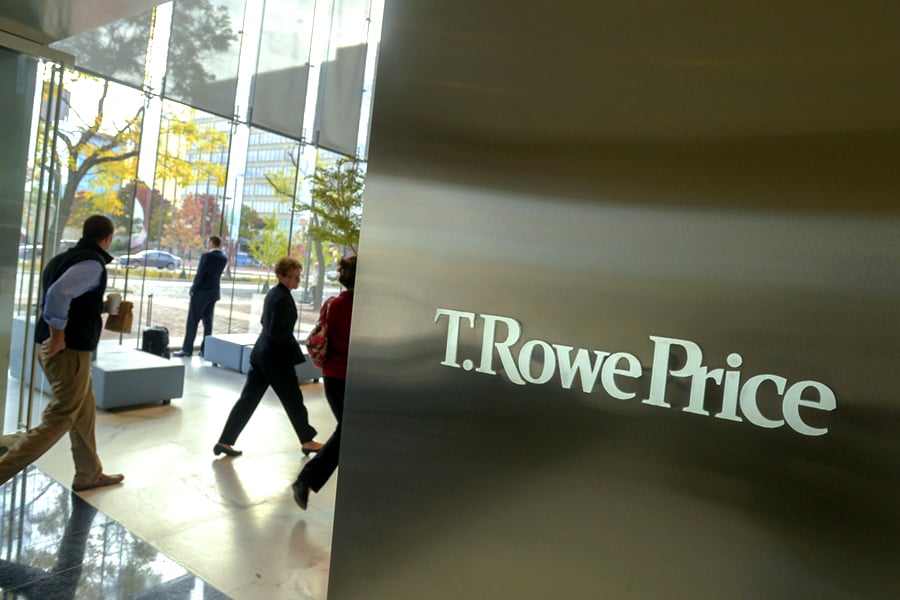

Starting in February, the more than 9,000 financial advisers that custody client assets at Charles Schwab & Co. will have no-transaction-fee access to the least-expensive share class mutual funds offered by T. Rowe Price.
The arrangement between the mega-custodian in the process of consolidating its TD Ameritrade acquisition and the $1.6 trillion Baltimore-based fund complex represents a distribution channel that Schwab’s largest competitor has already deeply established.
Fidelity Institutional’s no-transaction-fee platform, which has been around since 2017, offers advisers custodying there access to more than 3,000 institutional share class mutual funds from more than 225 fund families.
On the question of potentially being late to the game, Heather Fischer, head of third-party platforms at Schwab, said, “The timing is a combination of us responding directly to what our RIA clients are increasingly telling us they want, and having the right firm with which to launch this effort. Through this new relationship, Schwab enables advisers to purchase the lowest cost share class from T. Rowe Price no transaction fees, which advisers can’t do anywhere else.”
While Schwab and T. Rowe have a financial arrangement around the new distribution plan, financial advisers and their clients are expected to benefit by no longer having to pay $24 commissions for purchasing the lower-cost I-share class funds.
Schwab is giving up the commission revenue and T. Rowe is giving up between 12 and 16 basis points of fund management fees by steering assets away from its more expensive retail investor class funds that are already available to advisers for no transaction fees.
“This is essentially giving advisers that clear through Schwab the choice of having a mutual fund or ETF strategy and taking cost out of the equation,” said Todd Rosenbluth, director of mutual fund and ETF research at CFRA.
“The adviser will benefit from this if they like T. Rowe Price as an active manager,” he added.
T. Rowe, which was one of the last mutual fund company holdouts to enter the ETF market, has 120 institutional share class mutual funds available that will now stack up pricewise against their fledgling ETF lineup.
For example, the actively managed T. Rowe Price Blue Chip Growth ETF (TCHP), launched in August 2020, charges 57 basis points, which compares to the T. Rowe Price Blue Chip Growth I (TBCIX) institutional share class mutual fund at 56 basis points.
The investor class version T. Rowe Price Blue Chip Growth (TRBCX) has an expense ratio of 68 basis points.
“This is a win for T. Rowe that is potentially losing business as investors rotate toward ETFs,” Rosenbluth said. “It has become harder for a mutual fund business to grow and gather new assets in the face of growing competition from active ETFs, including within their own family.”
Steve Larson, head of wealth management platforms, U.S. intermediaries at T. Rowe, said the exclusive arrangement with Schwab “removes the friction” for financial advisers building client portfolios.
“Advisers use our funds quite a bit, and they have a strong desire for the lowest-cost share class we have,” he added.
Initially, the no-transaction-fee arrangement will not apply to the roughly 5,500 custody clients joining the Schwab platform from TD, but Fischer said including all advisers who custody at Schwab is the goal.
“There is a dramatic amount of operational complexity” involved in the merger of the two custodians, she said, adding that the “ultimate goal” is to give all advisers coming from TD access.

By listening for what truly matters and where clients want to make a difference, advisors can avoid politics and help build more personal strategies.

JPMorgan and RBC have also welcomed ex-UBS advisors in Texas, while Steward Partners and SpirePoint make new additions in the Sun Belt.

Counsel representing Lisa Cook argued the president's pattern of publicly blasting the Fed calls the foundation for her firing into question.

The two firms violated the Advisers Act and Reg BI by making misleading statements and failing to disclose conflicts to retail and retirement plan investors, according to the regulator.

Elsewhere, two breakaway teams from Morgan Stanley and Merrill unite to form a $2 billion RIA, while a Texas-based independent merges with a Bay Area advisory practice.
Orion's Tom Wilson on delivering coordinated, high-touch service in a world where returns alone no longer set you apart.
Barely a decade old, registered index-linked annuities have quickly surged in popularity, thanks to their unique blend of protection and growth potential—an appealing option for investors looking to chart a steadier course through today's choppy market waters, says Myles Lambert, Brighthouse Financial.
